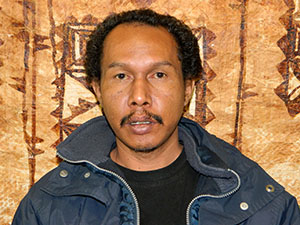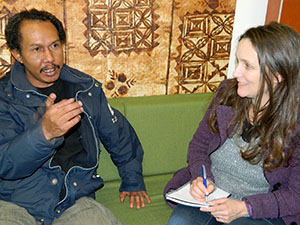
 AUCKLAND (Pacific Media Watch): The first West Papuan journalist to visit New Zealand has made a call for freedom for West Papua, and for the Indonesian government occupiers to lift the ban on foreign journalists.
AUCKLAND (Pacific Media Watch): The first West Papuan journalist to visit New Zealand has made a call for freedom for West Papua, and for the Indonesian government occupiers to lift the ban on foreign journalists.
Victor Mambor, 39, editor of the Jayapura-based newspaper and website Tabloid Jubi, has spent a week in the country lobbying for support for freedom of media visits to West Papua.
The chairperson of West Papua's branch of the Alliance of Independent Journalists (AJI), Mambor has been travelling around with human rights activist Maire Leadbeater of West Papua Action Auckland and Paul Bensemann, the only New Zealand journalist to have reported from West Papua in recent years.
At the heart of Mambor's campaign is his call to the Indonesian occupiers of West Papua to lift the ban on foreign journalists.
Sensitive to criticism that the outside world is barred from getting a glimpse into the military occupation of West Papua, the Indonesian government has produced statistics saying they are granting many foreign journalists permits to visit West Papua and report.
But, says Mambor, nearly all the permits granted have been for "anthropological stories" on the collections of skulls of Japanese citizens who were killed in West Papua in World War Two. Journalists from other countries are rarely granted permits if they want to report on human rights abuses or political issues.
When journalists from Europe and other places want to report on West Papua, they need to submit a proposal giving full details of the stories they will cover. Their applications for permits then go to a clearing house in Indonesia.
'Lose the moment'
Mambor says from there, the journalists are referred from pillar to post for months until they "lose the moment" and give up on getting permission. In addition, foreign journalists who enter the country without disclosing that they intend to report on Indonesia's human rights abuses, may be banned in the future.
"Even journalists who have permits are still followed by Indonesian intelligence once they arrive. In my opinion, there is still a ban, effectively," Mambor told Pacific Media Watch.
The Indonesian government also has ways of finding out who is critical of their human rights abuses and of keeping those journalists out, Mambor says.
Mambor is also lobbying for support for West Papuan journalists, as he has done in Geneva and the United States.
"There is very limited concern about our situation. When journalists in Java have a problem, many journalists will fight strongly for them. When we have a problem, it is different," he says.
When Indonesian and West Papuan journalists cover demonstrations, the Indonesian police and military treat the West Papuan journalists like protesters, while affording press freedom to the Indonesian journalists.
"They can even beat and arrest West Papuan journalists," says Mambor.
Press raided
Some recent problems include the Indonesian police having raided the printing press of Pelita magazine and confiscating all copies which had the West Papuan Morning Star flag printed on the cover.
In another case, Bintang Papua newspaper laid a complaint with the police against some civilians who had threatened their journalists. But under the guise of offering protection, the Indonesian police visited some newspaper offices in Jayapura and took photos of the journalists at Papua Post office while they were working, which caused confusion, Mambor says.
Mambor spoke of a gruesome practice whereby the Indonesian police and military make videos and take photos of West Papuans that they have tortured and killed.
These are sent to commanding officers and some inevitably leak into the public domain.
West Papuan journalists cannot go to the jungle to document the Indonesian war against freedom fighters themselves, as they would be shot on sight, Mambor says.
Mambor would like foreign journalists to make direct contact with West Papuan journalists to improve coverage of his country.
Mambor knows he is taking a risk by embarking on a speaking tour of New Zealand.
Police questioning
Previously, he has been "invited" by the Indonesian police for meetings after returning from speaking tours in Geneva and Brazil.
"I try not to take this seriously. I only meet the Indonesian police in a public place like a cafe or a hotel and I tell them to search google or read my newspaper if they want to know what I have written," Mambor says.
At the moment, the public lack information about the West Papuan struggle, he says.
Many people do not even realise that West Papua has been under a 50-year military occupation and thousands of West Papuans have been killed by the Indonesian military during that time. The public tend to think that West Papua is the same place as the neigbouring and independent state of Papua New Guinea.
"Journalists in New Zealand need to learn deeply about West Papua and understand what context we are struggling in. We are not asking for special autonomy but we want our self-determination. Journalists need to break down the wall and learn freely about our struggle," he says.
Mambor pointed to a story broken by Bensemann in January - that the New Zealand police were giving money to Indonesia for police training.
"The police used much of that money to kill West Papuans. They were killed with your money. Maybe people didn't know about that before," says Mambor.
He is speaking at a seminar this weekend organised by West Papua Action Auckland.
NZ Greens call for 'media freedom' in West Papua
This work is licensed under a Creative Commons Attribution-NonCommercial 3.0 New Zealand Licence.




